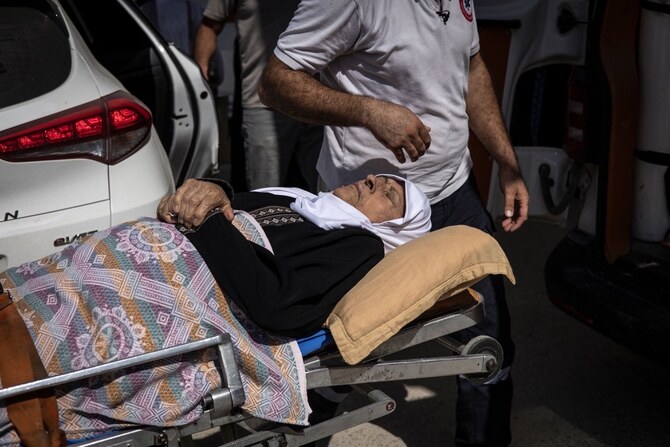
- ARAB NEWS
- 09 Jul 2025

JENIN: Israeli raids have left wrecked roads, bullet-riddled buildings, and debris-strewn streets in the occupied West Bank city of Jenin, preventing ambulances from reaching those in desperate need of care.
“It is not only difficult but also unsafe to reach the hospital during clashes,” said Wissam Baker, the director of Jenin’s hospital.
Patients needing dialysis, chemotherapy, or maternity care are particularly vulnerable, he said, as delays in treatment could be life-threatening.
Yet their lives are also at risk when trying to get treatment.
“During any incursion, those people have difficulty reaching the hospital,” Baker said.
Israeli forces have mounted several raids over the past year, which they call “counter-terrorism operations,” targeting Jenin’s refugee camp, known as a stronghold for militant groups.
Since the Gaza war began on Oct. 7 last year, the frequency and intensity of these raids have escalated. At least 711 Palestinians have been killed in the West Bank, according to the UN.
Ambulances have come under army fire and are invariably searched, health workers and locals said, while roads leading to the hospital are frequently blocked.
Hazem Masarwa, a paramedic with decades of experience, pointed to bullet holes in his ambulance.
“Before Oct. 7, the obstacles were minor,” he said, referring to the day Hamas launched its unprecedented attack on Israel, triggering war in Gaza.
But now, “with every raid they carry out, they close the entrances to hospitals … it has become routine,” he said.
Masarwa has witnessed two patients die from a lack of access to health care in the past year.
The Palestinian Red Crescent reported 804 violations of its medical missions in the West Bank and East Jerusalem over that period.
It said at least 14 people “died because they were kept from receiving the emergency medical services that they needed.”
On the night of Sept.1-2, during a 10-day Israeli raid in Jenin, Umaima Awadin feared for her life as she went into labor.
She spent four hours navigating army orders as contractions grew closer together.
“It really was a situation where you feel between life and death,” she said, still in shock.
“I kept on asking myself, ‘Who will take care of my children?’“
When she finally reached a hospital and gave birth to a boy, both experienced complications.
In her neighborhood, roads are torn up, and buildings bear the scars of bullet holes.
Nearby, a few young men loiter by destroyed houses, rifles strapped to their chests.
When patients reach the hospital, their shoes are caked in mud and rubble dust, said an emergency nurse.
The smell of sewage from damaged pipes torn up by army bulldozers lingers.
“Can we live like this?” asked Najet, whose husband, a dialysis patient, has been receiving only partial treatments for months.
“Israel continues to attack the West Bank at the same time as Gaza, not only with weapons but also by keeping people from getting their treatment,” she said.
“My husband could die if he doesn’t get dialysis.”
Baker said his team has been transferring patients to other hospitals, particularly Nablus, about an hour away.
Non-governmental organizations have stepped in, offering people first aid training, though few expect the situation to improve.
Umm Akram, who fled during an August raid, left to protect her daughter, who suffers from high blood pressure. She feared she would go “10 days without medicine.”
Upon her return, the house had been ransacked and “turned upside down,” and her garden destroyed by an explosion.
To Umm Akram, it was a price to pay for her daughter’s health.
AFP